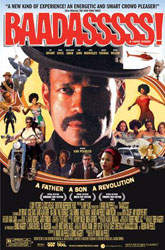 Director:
Mario Van Peebles
Starring:
Mario Van Peebles
Khleo Thomas
Joy Bryant
Ossie Davis
Nia Long
Paul Rodriguez
Terry Crews
Saul Rubinek
Release: 28 May 04
IMDb
|
Baadasssss! 
BY: DAVID PERRY
“No crew has every looked like this,” Melvin Van Peebles says
to the assembled actors and technicians hired for his 1971 film Sweet
Sweetback’s Baadassss Song. In the scene recreated for Baadassss!, the
dramatization of Van Peebles attempt to make Sweet Sweetback directed by his
son Mario Van Peebles, the director has the imagination and intensity of any
independent filmmaker. Chomping on a cigar, Van Peebles promises to be the
director to finally break the chains around ethnic filmmakers. His crew -- a
collective of blacks, whites, and Latinos -- feel the power of his passion,
and their resolute security in remaining with him because they knew history
was in front of them kept them working long days for little (if any) pay.
What is notable about Sweet Sweetback’s Baadassss Song isn’t its artistry.
Considering that it is a fairly rote, barely realized rant during much of
its duration, the reason it merits being reimagined through the eyes of its
director’s son is because those crew members were right. Sweet Sweetback was
history -- it showed that films could be made for an urban or strictly
African American audience and still be a huge hit. Not every actress had to
be as lilywhite as Doris Day. Soon there were packed houses to see women of
color like Pam Grier and Diahann Carroll in the somewhat condescendingly
labeled blaxploitation films.
Van Peebles was the Oscar Micheaux American cinema had lacked for decades.
Even when a film like The Children’s Hour brought homosexuality to the
screen in the early 1960s, truly accessible African American film art was
nonexistent. Sweet Sweetback was, ironically enough, The Birth of a Nation
for black cinema. Van Peebles, who’s been a major force in the arts since,
is the man who took what Micheaux had started and allowed new generations to
thrive: Haile Gerima, Spike Lee, John Singleton, and Kasi Lemmons.
His son recognizes this, and, as if mystified that his father was ever able
to put all this together, dedicates Baadassss! to a filial devotional, a
chance to let his dad know just how much he reveres the achievements that
he’s had. Mario, regardless of the name he carries, has his father to thank
for the film career he’s had, and, despite what comes across as a lingering
disdain for his Melvin’s paternal instincts, the affection is truly
engaging.
It certainly helps that the production of Sweet Sweetback was a wreck,
filled with financial woes, arrested crewmembers, and Melvin’s weakening
eyesite. Regardless of what he achieved by getting Sweet Sweetback into
theaters (and the additional hurdles that brought: uninterested exhibitors,
an X rating “by an all-white jury,” lionization of a cop killer, and a
fairly graphic sex scene), the fact that the film was ever completed is
testament to the mentality of Melvin Van Peebles. Through Mario’s
personification, Melvin’s devotion to the art -- often at the expense of
friends and family -- is one of simultaneous respectability and disgrace.
The film, criticized for its themes and its pandering towards a
“lower-class” audience, almost broke Melvin Van Peebles. That it came so
close -- as the real man sneers at the camera after the credits, smoke
framing his face like a god or devil -- is testament to his willingness to
die for his art, his people, and, ultimately, his son.
 |

